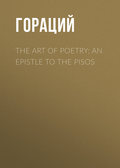
Гораций
The Works of Horace
Poets wish either to profit or to delight; or to deliver at once both the pleasures and the necessaries of life. Whatever precepts you give, be concise; that docile minds may soon comprehend what is said, and faithfully retain it. All superfluous instructions flow from the too full memory. Let what ever is imagined for the sake of entertainment, have as much likeness to truth as possible; let not your play demand belief for whatever [absurdities] it is inclinable [to exhibit]: nor take out of a witch's belly a living child that she had dined upon. The tribes of the seniors rail against every thing that is void of edification: the exalted knights disregard poems which are austere. He who joins the instructive with the agreeable, carries off every vote, by delighting and at the same time admonishing the reader. This book gains money for the Sosii; this crosses the sea, and continues to its renowned author a lasting duration.
Yet there are faults, which we should be ready to pardon: for neither does the string [always] form the sound which the hand and conception [of the performer] intends, but very often returns a sharp note when he demands a flat; nor will the bow always hit whatever mark it threatens. But when there is a great majority of beauties in a poem, I will not be offended with a few blemishes, which either inattention has dropped, or human nature has not sufficiently provided against. What therefore [is to be determined in this matter]? As a transcriber, if he still commits the same fault though he has been reproved, is without excuse; and the harper who always blunders on the same string, is sure to be laughed at; so he who is excessively deficient becomes another Choerilus; whom, when I find him tolerable in two or three places, I wonder at with laughter; and at the same time am I grieved whenever honest Homer grows drowsy? But it is allowable, that sleep should steal upon [the progress of] a king work.
As is painting, so is poetry: some pieces will strike you more if you stand near, and some, if you are at a greater distance: one loves the dark; another, which is not afraid of the critic's subtle judgment, chooses to be seen in the light; the one has pleased once, the other will give pleasure if ten times repeated.
O ye elder of the youths, though you are framed to a right judgment by your father's instructions, and are wise in yourself, yet take this truth along with you, [and] remember it; that in certain things a medium and tolerable degree of eminence may be admitted: a counselor and pleader at the bar of the middle rate is far removed from the merit of eloquent Messala, nor has so much knowledge of the law as Casselius Aulus, but yet he is in request; [but] a mediocrity in poets neither gods, nor men, nor [even] the booksellers' shops have endured. As at an agreeable entertainment discordant music, and muddy perfume, and poppies mixed with Sardinian honey give offense, because the supper might have passed without them; so poetry, created and invented for the delight of our souls, if it comes short ever so little of the summit, sinks to the bottom.
He who does not understand the game, abstains from the weapons of the Campus Martius: and the unskillful in the tennis-ball, the quoit, and the troques keeps himself quiet; lest the crowded ring should raise a laugh at his expense: notwithstanding this, he who knows nothing of verses presumes to compose. Why not! He is free-born, and of a good family; above all, he is registered at an equestrian sum of moneys, and clear from every vice. You, [I am persuaded,] will neither say nor do any thing in opposition to Minerva: such is your judgment, such your disposition. But if ever you shall write anything, let it be submitted to the ears of Metius [Tarpa], who is a judge, and your father's, and mine; and let it be suppressed till the ninth year, your papers being held up within your own custody. You will have it in your power to blot out what you have not made public: a word ice sent abroad can never return.
Orpheus, the priest and Interpreter of the gods, deterred the savage race of men from slaughters and inhuman diet; once said to tame tigers and furious lions: Amphion too, the builder of the Theban wall, was said to give the stones moon with the sound of his lyre, and to lead them whithersover he would, by engaging persuasion. This was deemed wisdom of yore, to distinguish the public from private weal; things sacred from things profane; to prohibit a promiscuous commerce between the sexes; to give laws to married people; to plan out cities; to engrave laws on [tables of] wood. Thus honor accrued to divine poets, and their songs. After these, excellent Homer and Tyrtaeus animated the manly mind to martial achievements with their verses. Oracles were delivered in poetry, and the economy of life pointed out, and the favor of sovereign princes was solicited by Pierian drains, games were instituted, and a [cheerful] period put to the tedious labors of the day; [this I remind you of,] lest haply you should be ashamed of the lyric muse, and Apollo the god of song.
It has been made a question, whether good poetry be derived from nature or from art. For my part, I can neither conceive what study can do without a rich [natural] vein, nor what rude genius can avail of itself: so much does the one require the assistance of the other, and so amicably do they conspire [to produce the same effect]. He who is industrious to reach the wished-for goal, has done and suffered much when a boy; he has sweated and shivered with cold; he has abstained from love and wine; he who sings the Pythian strains, was a learner first, and in awe of a master. But [in poetry] it is now enough for a man to say of himself: "I make admirable verses: a murrain seize the hindmost: it is scandalous for me to be outstripped, and fairly to Acknowledge that I am ignorant of that which I never learned."
As a crier who collects the crowd together to buy his goods, so a poet rich in land, rich in money put out at interest, invites flatterers to come [and praise his works] for a reward. But if he be one who is well able to set out an elegant table, and give security for a poor man, and relieve when entangled in glaomy law-suits; I shall wonder if with his wealth he can distinguish a true friend from false one. You, whether you have made, or intend to make, a present to any one, do not bring him full of joy directly to your finished verses: for then he will cry out, "Charming, excellent, judicious," he will turn pale; at some parts he will even distill the dew from his friendly eyes; he will jump about; he will beat the ground [with ecstasy]. As those who mourn at funerals for pay, do and say more than those that are afflicted from their hearts; so the sham admirer is more moved than he that praises with sincerity. Certain kings are said to ply with frequent bumpers, and by wine make trial of a man whom they are sedulous to know whether he be worthy of their friendship or not. Thus, if you compose verses, let not the fox's concealed intentions impose upon you.
If you had recited any thing to Quintilius, he would say, "Alter, I pray, this and this:" if you replied, you could do it no better, having made the experiment twice or thrice in vain; he would order you to blot out, and once more apply to the anvil your ill-formed verses: if you choose rather to defend than correct a fault, he spent not a word more nor fruitless labor, but you alone might be fond of yourself and your own works, without a rival. A good and sensible man will censure spiritless verses, he will condemn the rugged, on the incorrect he will draw across a black stroke with his pen; he will lop off ambitious [and redundant] ornaments; he will make him throw light on the parts that are not perspicuous; he will arraign what is expressed ambiguously; he will mark what should be altered; [in short,] he will be an Aristarchus: he will not say, "Why should I give my friend offense about mere trifles?" These trifles will lead into mischiefs of serious consequence, when once made an object of ridicule, and used in a sinister manner.
Like one whom an odious plague or jaundice, fanatic phrensy or lunacy, distresses; those who are wise avoid a mad poet, and are afraid to touch him; the boys jostle him, and the incautious pursue him. If, like a fowler intent upon his game, he should fall into a well or a ditch while he belches out his fustian verses and roams about, though he should cry out for a long time, "Come to my assistance, O my countrymen;" not one would give himself the trouble of taking him up. Were any one to take pains to give him aid, and let down a rope; "How do you know, but he threw himself in hither on purpose?" I shall say: and will relate the death of the Sicilian poet. Empedocles, while he was ambitious of being esteemed an immortal god, in cold blood leaped into burning Aetna. Let poets have the privilege and license to die [as they please]. He who saves a man against his will, does the same with him who kills him [against his will]. Neither is it the first time that he has behaved in this manner; nor, were he to be forced from his purposes, would he now become a man, and lay aside his desire of such a famous death. Neither does it appear sufficiently, why he makes verses: whether he has defiled his father's ashes, or sacrilegiously removed the sad enclosure of the vindictive thunder: it is evident that he is mad, and like a bear that has burst through the gates closing his den, this unmerciful rehearser chases the learned and unlearned. And whomsoever he seizes, he fastens on and assassinates with recitation: a leech that will not quit the skin, till satiated with blood.





